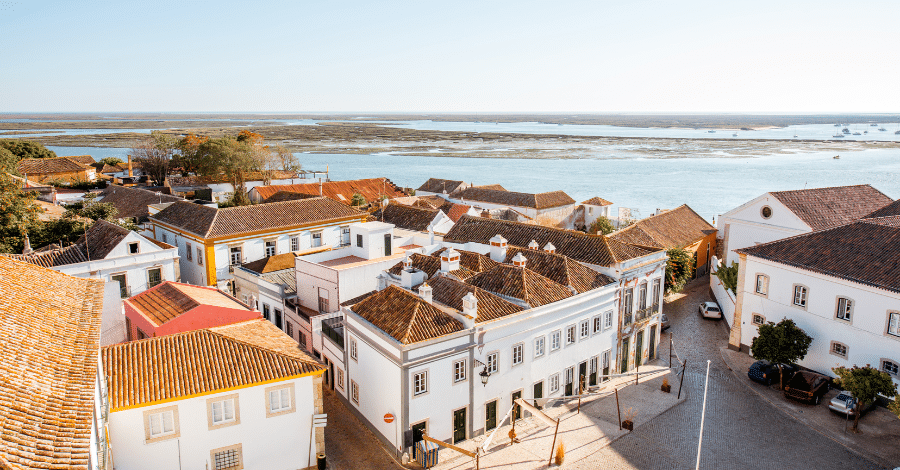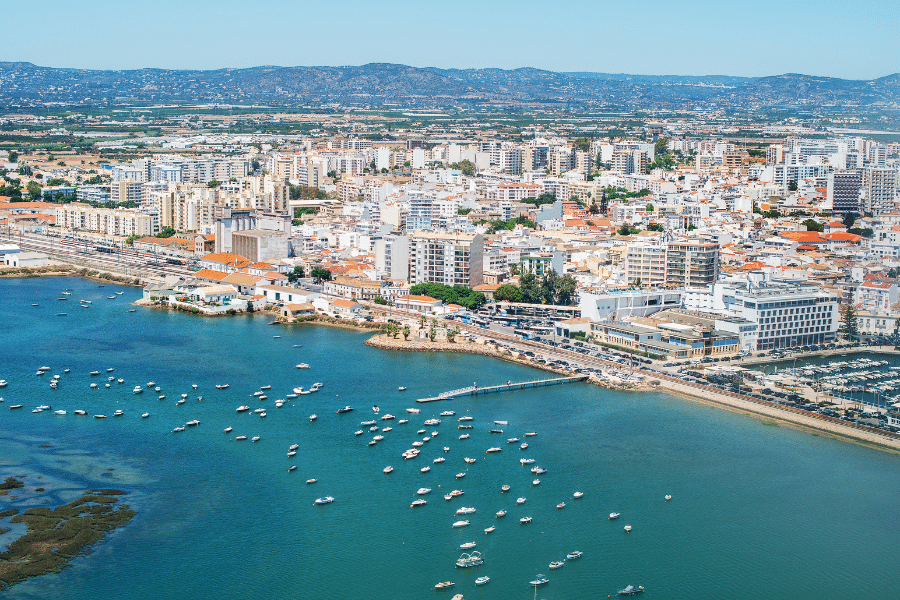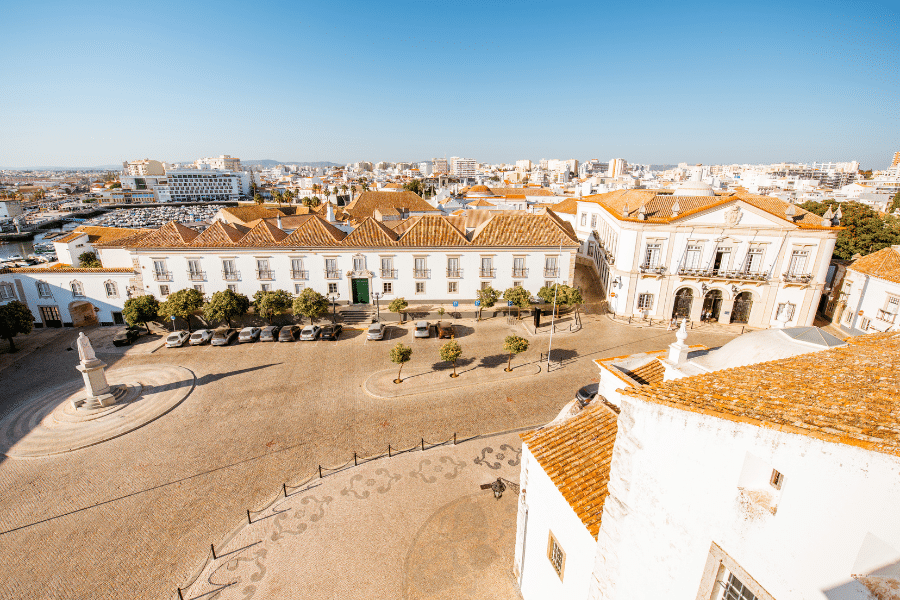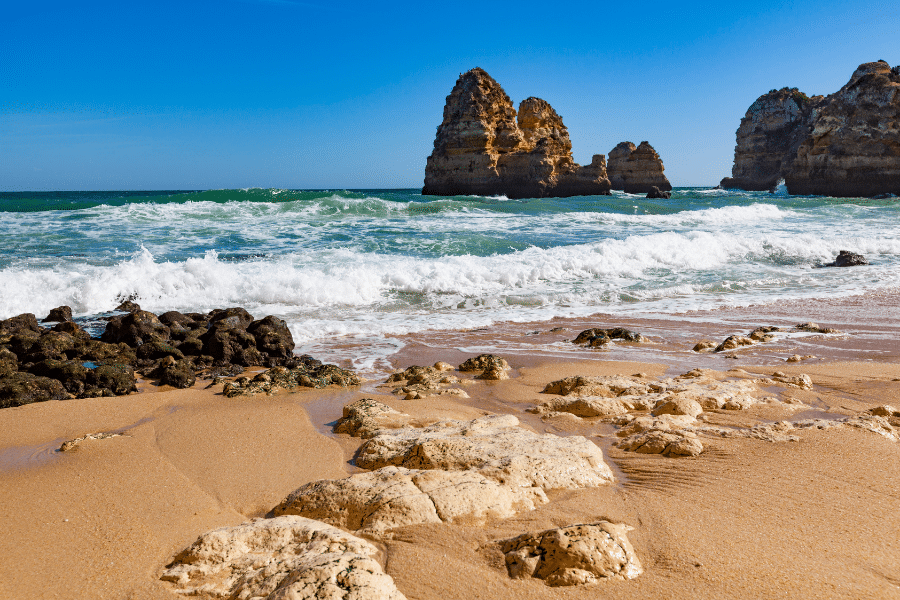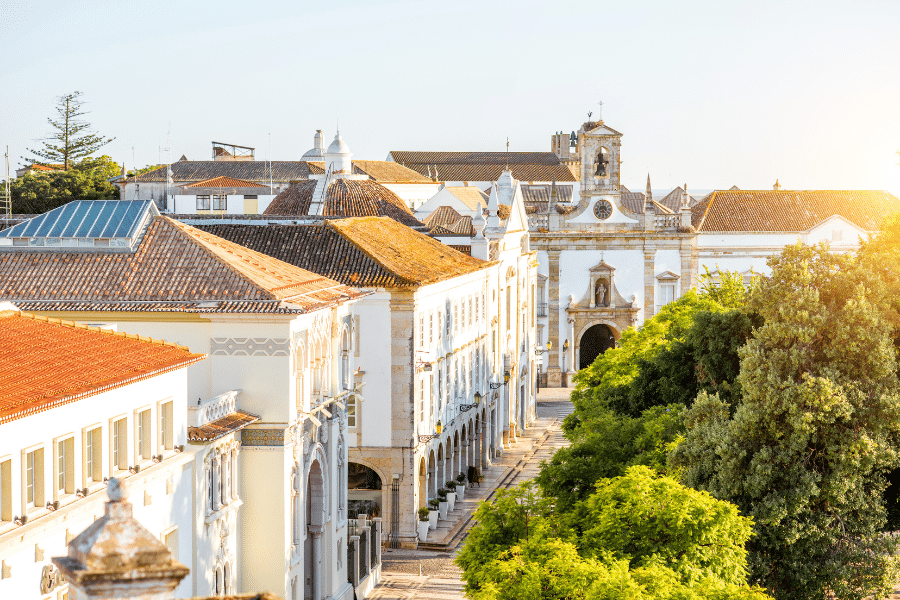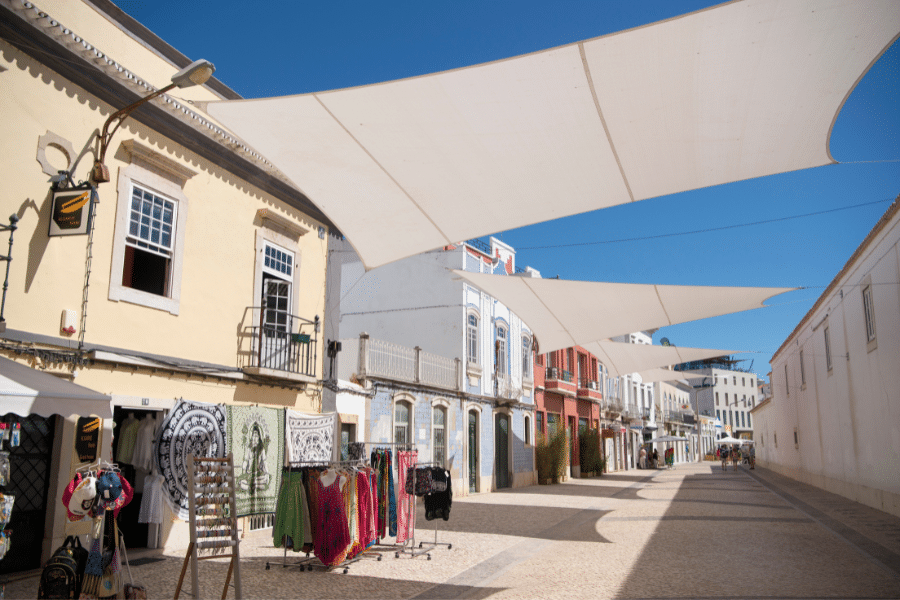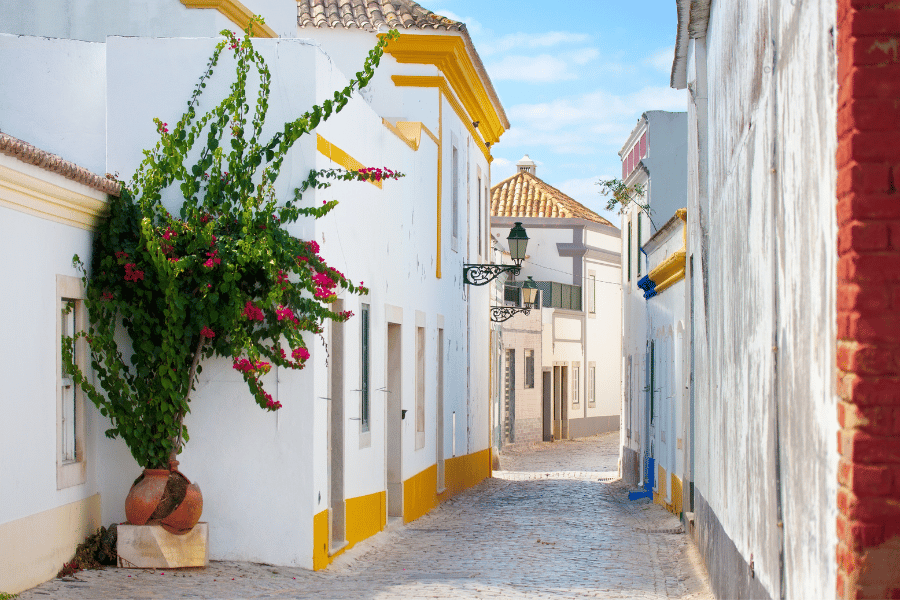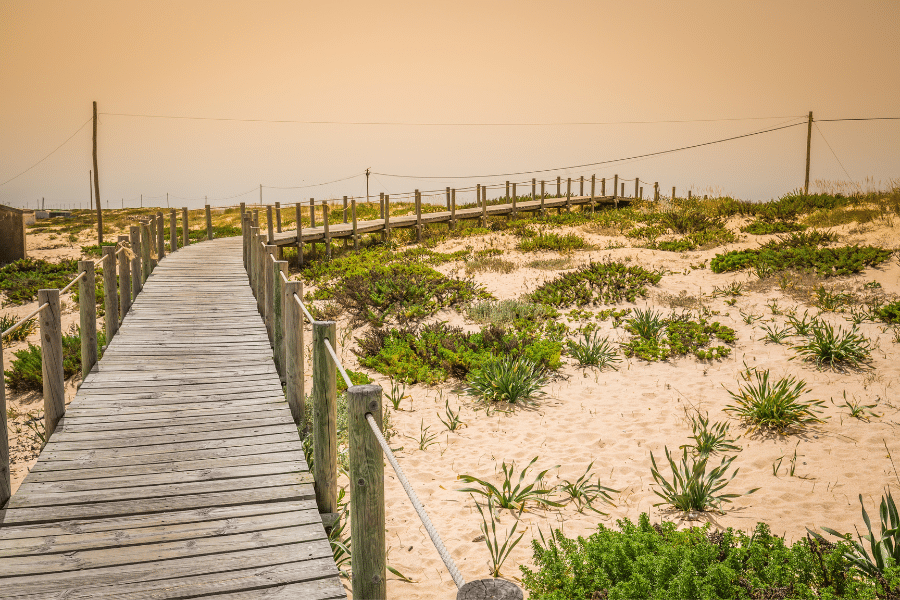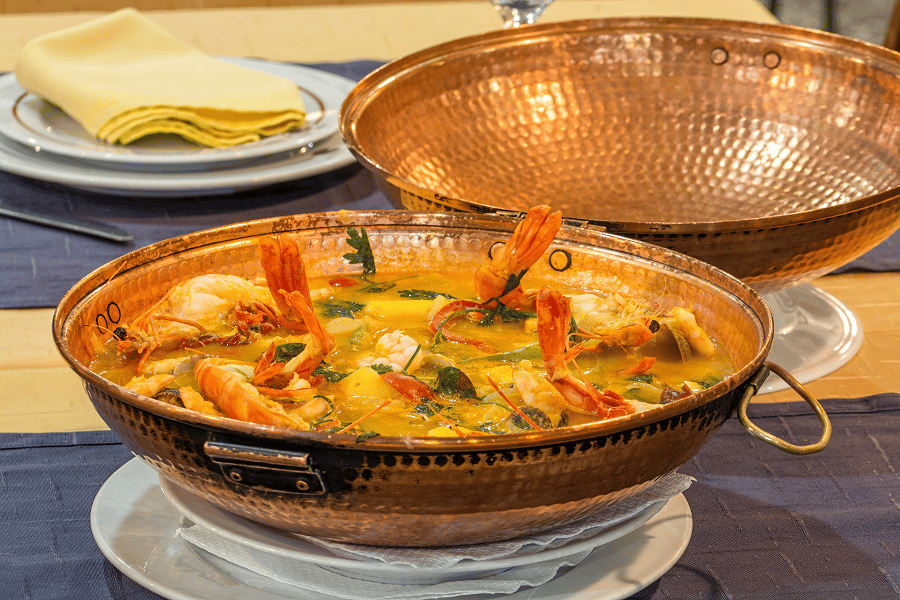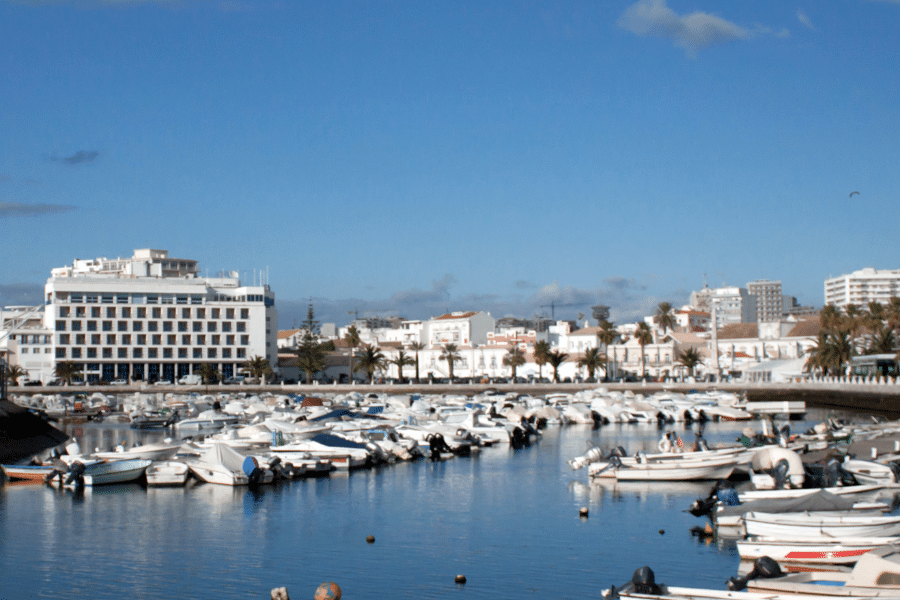Located in the heart of the Algarve, Faro is a popular choice for expats and tourists alike who find the city highly desirable to live in. From the narrow alleys of the old town to the idyllic beaches, Faro offers a variety of amenities for everyone visiting or living in Portugal.
Whether you’re seeking a peaceful retirement retreat or an exciting adventure, this vibrant city will capture your imagination and leave you yearning for more. So, come along as we take you on a journey through the beauty and wonder of Faro, Portugal.
Where is Faro Portugal?
Faro is located on the southern coast of Portugal, in the Algarve region. It is the capital city of the Algarve and has a population of around 61,000 people. The city is situated on the edge of the Ria Formosa lagoon, a protected natural park that is home to a variety of bird species and marine life.
Faro is easily accessible by car, train, and plane. By car, it is approximately a 2.5-hour drive from Lisbon. By train, you can take the Alfa Pendular or Intercidades trains from Lisbon to Faro, which takes around 2.5 hours. Faro also has an international airport that offers direct flights to many European destinations.
What is Faro like?
Faro has a rich cultural heritage, with its historic center retaining much of its original Moorish and Roman architecture. The city is surrounded by ancient walls, and its narrow streets are lined with whitewashed buildings and traditional Portuguese tiles. One of the main attractions in Faro is the stunning Cidade Velha (Old Town), which features a beautiful cathedral, museums, and a picturesque marina.
On the other side, the newer part of the city has a modern feel, with high-rise buildings, designer shops, and trendy bars and restaurants. The marina is also a hub of activity, with many boats offering trips along the Ria Formosa lagoon.
What’s the weather like in Faro?
Located in southern Portugal, Faro enjoys a warm Mediterranean climate, with mild temperatures and plenty of sunshine throughout most of the year. The summers are hot and dry, while the winters are mild and relatively wet.
During the summer months of June to August, temperatures in Faro typically range from 25°C to 30°C (77°F to 86°F), with occasional heatwaves pushing temperatures higher. These months are also the driest, with very little precipitation and plenty of sunshine.
In the autumn months of September to November, temperatures start to cool down slightly, with average highs ranging from 21°C to 26°C (70°F to 79°F). This season can also see some rainfall, although it usually doesn’t last for long and is interspersed with plenty of sunny days.
The winter months of December to February are the coolest and wettest period in Faro, with average temperatures ranging from 10°C to 16°C (50°F to 61°F). Rainfall is common during this season, with occasional storms bringing heavy downpours. However, even in winter, there are still many sunny days to enjoy and plenty of things to do.
Lastly, in the spring months of March to May, temperatures slowly rise again, with average highs ranging from 19°C to 23°C (66°F to 73°F). This season can also see some rainfall, but as with autumn, it is usually short-lived and interspersed with sunny days.
Overall, Faro enjoys a mild and pleasant climate throughout most of the year, with plenty of sunny days and relatively low levels of precipitation.
How to get to Faro Portugal
Faro is easily accessible by various modes of transportation.
- By plane: Faro International Airport is located just 2.5 miles away from the city center and is well-connected to major cities across Europe. Several airlines operate direct flights to Faro from major cities like London, Paris, and Amsterdam, among others. From the airport, you can take a taxi, rent a car, or take public transportation to get to the city center.
- By train: Faro is also connected to other cities in Portugal by train. The city’s train station is located in the city center, making it easy to access the main attractions. You can take a train from Lisbon or Porto, which are both connected to Faro by regular trains. The journey from Lisbon takes approximately 3 hours, while the journey from Porto takes around 5 hours.
- By car: If you prefer to drive, Faro is easily accessible by car. The city is connected to the rest of Portugal via the A22 motorway, which runs along the Algarve coast. If you are driving from Lisbon, take the A2 motorway southwards and then switch to the A22 motorway near Albufeira. The journey from Lisbon takes around 2.5 hours, depending on traffic.
There are several convenient ways to get to Faro, whether you prefer to fly, take public transportation or drive. Once you arrive in Faro, you can explore the city and its surroundings by foot, bike, or public transportation.
Education in Faro Portugal
Faro is home to a variety of educational institutions, catering to the needs of students of all ages and backgrounds.
One of the most notable universities in the area is the University of Algarve, which has its main campus in Faro. The university offers a diverse range of programs in areas such as science, technology, arts, and humanities, attracting students from around the world. It is known for its excellent research facilities, and the quality of education it provides.
For students seeking an international education, Faro has several international schools, such as the Nobel International School Algarve, which provides an international education for students from kindergarten to grade 12. The school follows the International Baccalaureate program and offers a wide range of extracurricular activities, including sports, music, and drama.
In addition, Faro has several public schools, vocational schools, and language schools, providing a range of educational opportunities for students. These schools offer programs in various fields such as hospitality, tourism, and healthcare, making them ideal for students seeking vocational education.
Overall, Faro provides a diverse range of educational opportunities, making it an excellent destination for students looking to pursue higher education or seeking an international education.
The cost of living and real estate in Faro Portugal
The cost of living in Faro is lower than in some other coastal cities such as Cascais and closer to the national average for Portugal. As of 2023, the cost of living index for Faro is 61, slightly lower than the national average of 55.
Housing costs in Faro are generally lower than in the bigger cities of Portugal. The average price of a 2,000 square foot house is over $520,000 in Faro, or about $260 per square foot. The average rent for a one-bedroom apartment in the city center is around $700 per month. Other expenses such as groceries, transportation, and dining out are also relatively affordable, with prices similar to or slightly higher than the national average.
Real estate in Faro is also generally more affordable than in the bigger cities, depending on the location and type of property. For instance, Faro is 15-20% more affordable to live in than Albufeira and 25% cheaper than Lagos. On the other hand, real estate in Faro is 7-10% more expensive than Portimão.
Overall, while the cost of living in Faro is lower than in the bigger cities and many other coastal parts of Portugal, it is still important to carefully consider the expenses associated with living in the city, particularly housing costs.
Things to do in Faro Portugal
Faro offers a wide range of activities and attractions for both tourists and locals. Here are some of the top things to do in Faro:
- Discover amazing historic landmarks: Faro has a rich history, and visitors can explore several historic landmarks, such as the 13th-century Cathedral of Faro and the 16th-century walls of the Old Town. These sites offer a glimpse into the city’s past and are a must-visit for history buffs.
- Hit the beach: Faro is known for its stunning beaches, such as Praia de Faro and Ilha Deserta. Visitors can soak up the sun, swim in the ocean, or take a boat trip to explore the nearby islands.
- Attend Faro International Motorcycle Rally: This annual event takes place in July and attracts motorcycle enthusiasts from around the world. The rally features live music, exhibitions, and a massive motorcycle parade.
- Visit the Ria Formosa Natural Park: This beautiful nature reserve is a haven for bird watchers and nature lovers. Visitors can take a boat tour to explore the lagoons, marshes, and channels that make up the park.
- Try the local cuisine: Faro has a rich culinary heritage, and visitors can indulge in local specialties such as grilled sardines, octopus salad, and fig cake. The city is also known for its sweet almond liqueur, which is a must-try for those with a sweet tooth.
Lesser-known facts about Faro Portugal
Faro is a city with many hidden gems and interesting facts that are lesser known to tourists and expats. Here are a few things you might not know about Faro:
- Faro is the capital city of the Algarve region of Portugal and is often referred to as the “Gateway to the Algarve.” The city has a rich history dating back to Roman times, and visitors can explore the Old Town’s narrow streets, historic churches, and ancient walls.
- The Igreja do Carmo church in Faro is famous for its unique and macabre bone chapel. The walls and ceilings of the chapel are adorned with the bones and skulls of over 1,000 monks and other deceased individuals.
- Faro is home to one of the most important wetlands in Europe, the Ria Formosa Natural Park. This protected area is a paradise for birdwatchers and nature lovers and is home to over 20,000 species of birds, fish, and other wildlife.
- Faro has a strong Moorish influence, which can be seen in the city’s architecture and design. The city’s historic buildings feature intricate tile work, ornate arches, and colorful facades.
- Faro is a food lover’s paradise, with a wide range of culinary specialties. One lesser-known local delicacy is “cataplana,” a seafood stew cooked in a traditional copper pot that is unique to the Algarve region.
Exploring the lesser-known facts and hidden gems of the city can add a unique and unforgettable dimension to any visit.
Why move to Faro Portugal?
Faro Portugal is a fantastic place to move to for several reasons. Firstly, it boasts a warm and sunny climate that is perfect for outdoor activities such as swimming, boating, and sunbathing. Additionally, Faro is a safe and welcoming city with a strong sense of community, which is ideal for those looking to settle down in a new place. The city is also surrounded by beautiful natural landscapes, including the Ria Formosa natural park and the Atlantic Ocean.
Faro is also a culturally rich city, with a long and fascinating history that can be explored through its many museums, historic sites, and festivals. Additionally, Faro is home to a thriving arts and culture scene, with many galleries, theaters, and music venues showcasing local and international talent.
Finally, Faro is well-connected to other major cities in Portugal, including Lisbon and Porto, which are just a short plane or train ride away. This makes it easy to explore other parts of the country and to access additional job opportunities.
The downsides of living in Faro Portugal
While Faro is a beautiful and welcoming city, it is important to consider both the positive and negative aspects of living there before deciding to relocate. While there are many reasons to move to Faro, there are also some downsides to living in this coastal city, including:
- Cost of living: Faro is a popular tourist destination, and the cost of living can be higher than in other areas in Portugal, particularly for housing and dining out.
- High humidity: Faro’s location on the southern coast of Portugal means that it can experience high levels of humidity, especially during the summer months. This may be uncomfortable for some people and could require additional expenses for air conditioning or dehumidifiers.
- Crowded peak tourist season: During peak tourist season, the city can become crowded and noisy, especially around popular landmarks and beaches. This may be overwhelming for some residents who prefer a quieter and more peaceful living environment.
- Limited job opportunities: While there are job opportunities in the hospitality and tourism industries, there may be limited options for those seeking employment in other fields. As such, it may not be an ideal location for those looking for specific job opportunities.
Discover the charm of Faro
If you’re seeking a beautiful and welcoming place to live, Faro, Portugal, might just be the perfect destination for you. With its warm climate, stunning beaches, rich history, and delicious cuisine, Faro offers a unique quality of life that’s hard to find elsewhere. So, why not take the leap and make Faro your new home? With its welcoming community and endless possibilities for adventure, Faro is waiting to be discovered.
Explore more wonderful destinations for moving to Portugal:
- Guide to Cascais
- Guide to Coimbra
- Guide to Nazare
- Guide to Aveiro
- Guide to Lagos
- Guide to Evora
- Guide to Braga

